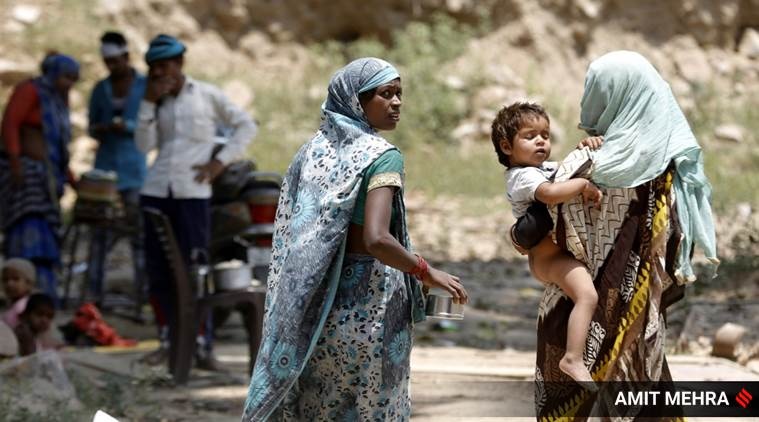 Some migrants who were born here, consider Punjab their first home. (Representational Photo)
Some migrants who were born here, consider Punjab their first home. (Representational Photo)
Palaniappan Swami can’t give an exact date but knows that his parents had landed in Jalandhar from Salem in Tamil Nadu some five decades back. The family got settled in Kazi Mandi area, which the Punjabis often refer to as Madrasi Mohalla. The area has at least 200 houses owned by people who came in from Tamil Nadu. Palaniappan claims that most of those settled in there are his extended family members or distant relatives.
A junk dealer by profession, Palaniappan has remained busy last few weeks trying to convince migrants not to leave Punjab.
“Most of the migrant population in Ward number 56 is from Tamil Nadu, Bihar, West Bengal, and Maharashtra. I have managed to stop most of them from leaving for their home states during the lockdown. As against 4,000 migrants here, not more than 100-150 have left for their native states,” says the 47-year-old, who proudly claims to be the only migrant elected as ward councillor in Jalandhar Municipal Corporation. He was elected in 2017 civic body elections on a Congress ticket.
“Once migrants living here return to their native states, they may not get work there too. Coming back would again be very difficult in present circumstances,” he says, adding that he and they are alike as “I too am a migrant but now consider Punjab, where I earn a living, my home”.
Well versed in Punjabi Language, Palaniappan says that he is not even a matriculate, but “I know the difficulties and pain” that migrants have to face. “I may have some power today, which I am utilising to serve the migrants in my ward”.
Sandhya, who goes only by her first name, is a ragpicker by profession. But the 42-year-old, who lives in a slum, has another identity too. A migrant from Maharashtra, she is a member in village Kang Sahbu’s 10-member panchayat. The slum is home to around 120 families from Maharashtra, who have been are living here since decades.
Sandhya, who traces her family to Nagpur, says that neither the state government nor the village panchayat came out to help the migrant families. There are around 100 kutcha houses and jhuggis in the area with no power supply, or proper water and sewerage connection. The slum dwellers mostly work as rag pickers or daily wagers and have been left with no source of income ever since the lockdown began.
“Politicians come here to seek our votes. They make promises of providing basic facilities, but have never fulfilled them. Our children study at charitable school opened by the Church people,” says Sandhya.
Despite all the difficulties, she and and the other migrants decided to stay on. Some, who were born here, consider Punjab their first home.
The older ones, like Sandhya, counselled the others against returning to their native states.
Another migrant who found a political position is 27-year-old Pinky Devi who was elected as councillor from Amritsar’s ward No. 15 in 2017. Pinky, who hails from Motihari in Bihar, is the first migrant to be who got elected as a councillor in Amritsar civic body. Her father-in-law, Ram Bali, is currently looking after the ward councilor’s work as Pinky is stranded in Bihar where she had gone to attend a marriage but got stuck due to the lockdown.
“We have migrants from Uttar Pradesh, Bihar, Madhya Pradesh, Gujarat, Rajasthan and several other states in ward No. 15. I have been trying to stop them from returning to their native states by providing ration kits supplied by the state government and the NGOs,” says Ram Bali.
Now 54, RamBali had come to Amritsar at the age of 14 along with some friends and decided to stay back.
“They all are my brothers irrespective of their states and to work for them is my priority,” says Ram Bali, who has now ventured into the real estate business after doing all types of jobs as a daily wager.
“I am a Punjabi now and the question of moving back to Bihar does not arise,” says Ram Bali who even has a chowk – ‘Ram Bali Chowk’ – named after him in Amritsar’s ward No. 13.
Similarly, 90 families from Bihar at Sanghowal village of Mehatpur area in Jalandhar also consider Punjab their home. Asha Devi, a former panchyat member, told The Indian Express that they had come from Bahgalpur in Bihar some two decades back and found a home in Punjab.
“Whether we get food and work or not, we will not move back to Bihar now,” says the farm labourer, who is also working to dissuade other migrants from going back.